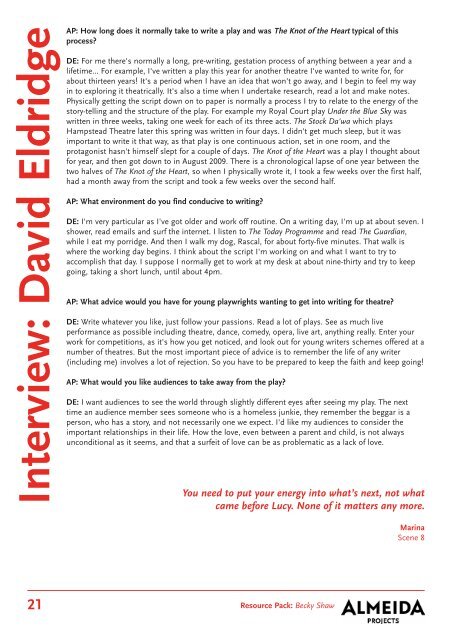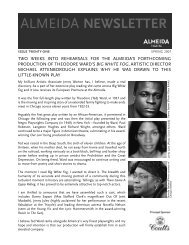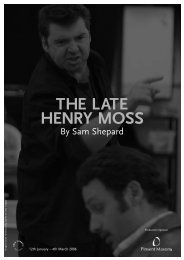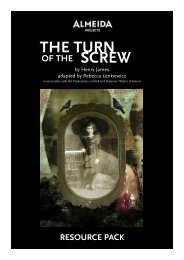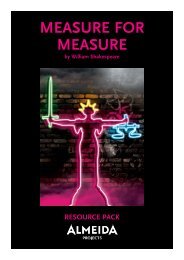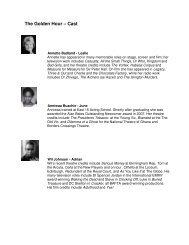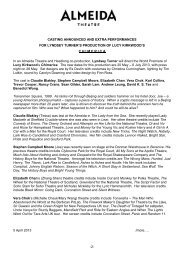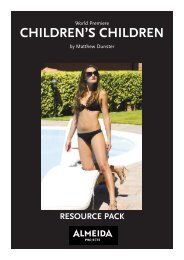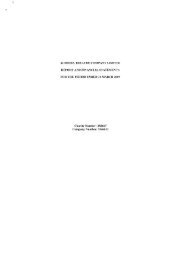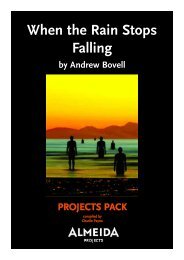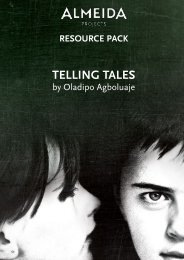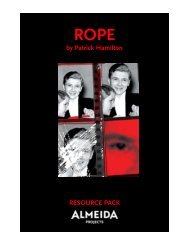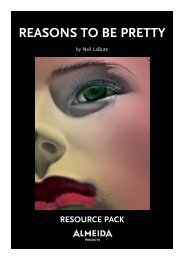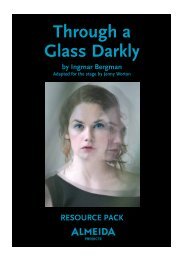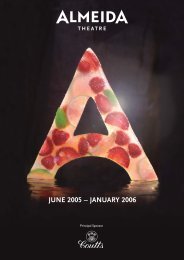KNOT HEART - Almeida Theatre
KNOT HEART - Almeida Theatre
KNOT HEART - Almeida Theatre
- No tags were found...
Create successful ePaper yourself
Turn your PDF publications into a flip-book with our unique Google optimized e-Paper software.
Interview: David EldridgeAP: How long does it normally take to write a play and was The Knot of the Heart typical of thisprocess?DE: For me there's normally a long, pre-writing, gestation process of anything between a year and alifetime... For example, I've written a play this year for another theatre I've wanted to write for, forabout thirteen years! It's a period when I have an idea that won't go away, and I begin to feel my wayin to exploring it theatrically. It's also a time when I undertake research, read a lot and make notes.Physically getting the script down on to paper is normally a process I try to relate to the energy of thestory-telling and the structure of the play. For example my Royal Court play Under the Blue Sky waswritten in three weeks, taking one week for each of its three acts. The Stock Da'wa which playsHampstead <strong>Theatre</strong> later this spring was written in four days. I didn't get much sleep, but it wasimportant to write it that way, as that play is one continuous action, set in one room, and theprotagonist hasn't himself slept for a couple of days. The Knot of the Heart was a play I thought aboutfor year, and then got down to in August 2009. There is a chronological lapse of one year between thetwo halves of The Knot of the Heart, so when I physically wrote it, I took a few weeks over the first half,had a month away from the script and took a few weeks over the second half.AP: What environment do you find conducive to writing?DE: I'm very particular as I've got older and work off routine. On a writing day, I'm up at about seven. Ishower, read emails and surf the internet. I listen to The Today Programme and read The Guardian,while I eat my porridge. And then I walk my dog, Rascal, for about forty-five minutes. That walk iswhere the working day begins. I think about the script I'm working on and what I want to try toaccomplish that day. I suppose I normally get to work at my desk at about nine-thirty and try to keepgoing, taking a short lunch, until about 4pm.AP: What advice would you have for young playwrights wanting to get into writing for theatre?DE: Write whatever you like, just follow your passions. Read a lot of plays. See as much liveperformance as possible including theatre, dance, comedy, opera, live art, anything really. Enter yourwork for competitions, as it's how you get noticed, and look out for young writers schemes offered at anumber of theatres. But the most important piece of advice is to remember the life of any writer(including me) involves a lot of rejection. So you have to be prepared to keep the faith and keep going!AP: What would you like audiences to take away from the play?DE: I want audiences to see the world through slightly different eyes after seeing my play. The nexttime an audience member sees someone who is a homeless junkie, they remember the beggar is aperson, who has a story, and not necessarily one we expect. I'd like my audiences to consider theimportant relationships in their life. How the love, even between a parent and child, is not alwaysunconditional as it seems, and that a surfeit of love can be as problematic as a lack of love.You need to put your energy into what’s next, not whatcame before Lucy. None of it matters any more.MarinaScene 821 Resource Pack: Becky Shaw


